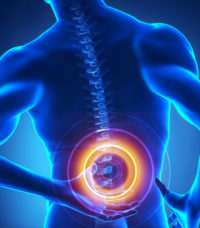Every person’s cancer journey is different. Depending on the type of cancer, the location of the mass, and the prognosis; patients can have a wide-variety of symptoms and experiences. Unfortunately, many people battling cancer find themselves suffering from hard-to-control, chronic pain. If you have been diagnosed with cancer or your loved one is battling cancer, you should know there are advanced options that go beyond opioids or pain medications to help successfully manage the pain.
Why Does Cancer Cause Pain?
Pain experienced during cancer may originate from the cancer, as a side effect from treatments, or may follow surgical or removal procedures.

Spinal Cord Compression
Tumors that originate or spread to the spinal column can compress the spinal nerve and cause pain, numbness, and weakness. Pain from spinal cord compression may radiate to other parts of the body or present as axial pain, characterized by a severe mid-back ache.
Local or Regional Cancer Pain
Tumors or cancer can cause intense pain in the areas of the body they affect, no matter where they are found. The consistency and intensity of a person’s pain often vary depending on the staging of their cancer and the level of metastasis. Patients with tumors or cancer that compress nerves innervating large areas of the body can experience radiating pain in those regional areas as well.
Treatment Associated Pain
Surgical Pain
After the removal of tumors, patients may experience pain during surgical recovery. If this pain does not pass after the expected healing window, patients may suffer from a more chronic condition such as Post-Mastectomy Syndrome or Failed Back Surgery Syndrome that can result after the removal of a tumor on the spine.
Peripheral Neuropathy
Chemotherapy can cause damage to the nerves resulting in pain, burning, tingling, or weakness. Peripheral Neuropathy can also be caused by a tumor compressing a nerve.
Neuritis
Radiation treatment for cancer may cause damage to the nerves called neuritis. Neuritis is the inflammation of the nerves that requires specialized treatment and pain management.
How Is Cancer Pain Typically Treated?
No matter what is used to treat pain, it’s essential to coordinate pain control with ongoing oncology treatments and interventional measures for the best outcomes. Pain medications and opioids can be effective in controlling pain in the short-term. However, many patients may be uncomfortable using medications long-term or may not want to continue use because of the numerous side effects such as drowsiness, confusion, and constipation.
Advanced Pain Treatment for Cancer
Dr. Alain de Lotbinière consults with each person and their oncologist to understand their current staging, treatment plans, and the origin of their pain to find the best way forward. He listens to concerns and ensures he understands each patient’s goals to help them choose the right next step in controlling their pain.
Advanced Cancer Pain Treatments Include:
- Intrathecal Pain Pumps
- Spinal Cord Stimulation
- Peripheral Nerve Stimulation
- Ablative Neurological Procedures
- Cordotomies
- Myelotomies
- Radiofrequency (RF)
- Ultrasound
- Cryotherapy
How Dr. Alain de Lotbinière Can Help Provide Cancer Pain Relief?
If you have been unable to control your cancer-associated pain, your pain is getting worse, or you want to explore other avenues, turn to Dr. Alain de Lotbinière. He will work with your current providers to create a cohesive approach to your treatment plan and ensure you understand every option available to you.
Dr. Alain de Lotbinière has spent his distinguished career advancing the treatment of complex pain conditions and finding welcome relief for patients that have exhausted all other paths. This expertise extends to helping patients battling cancer, giving them more options for managing and relieving their pain. Contact his office in White Plains, NY or Stamford, CT to schedule an appointment.

